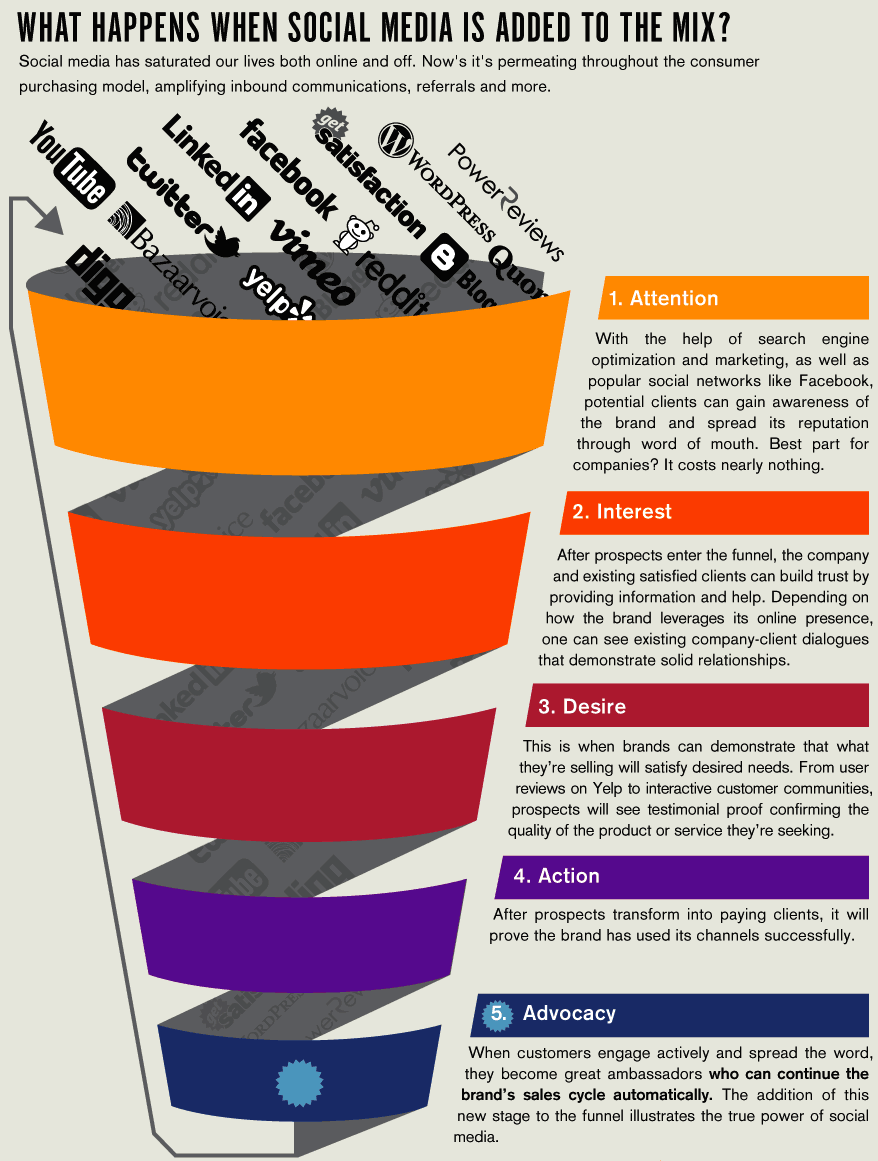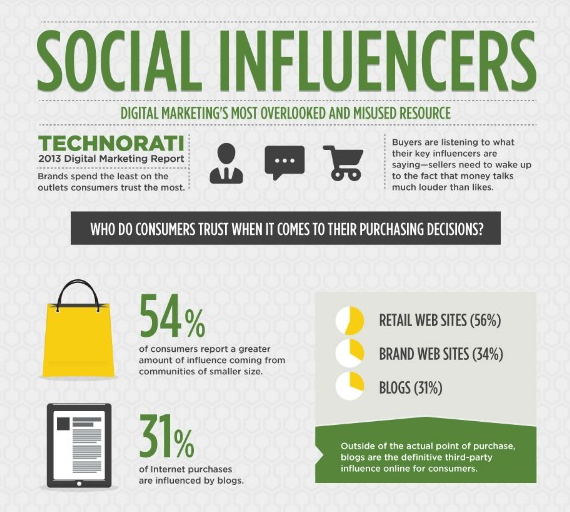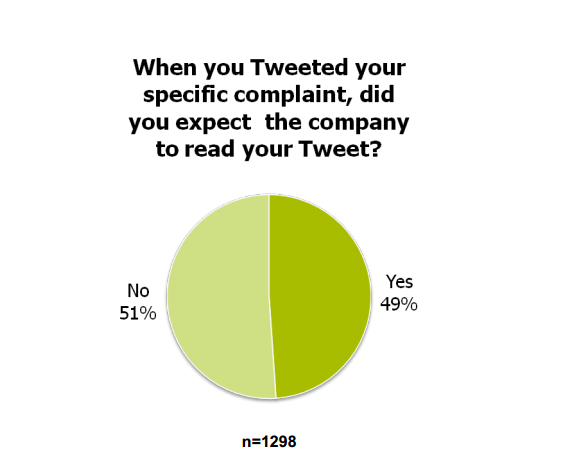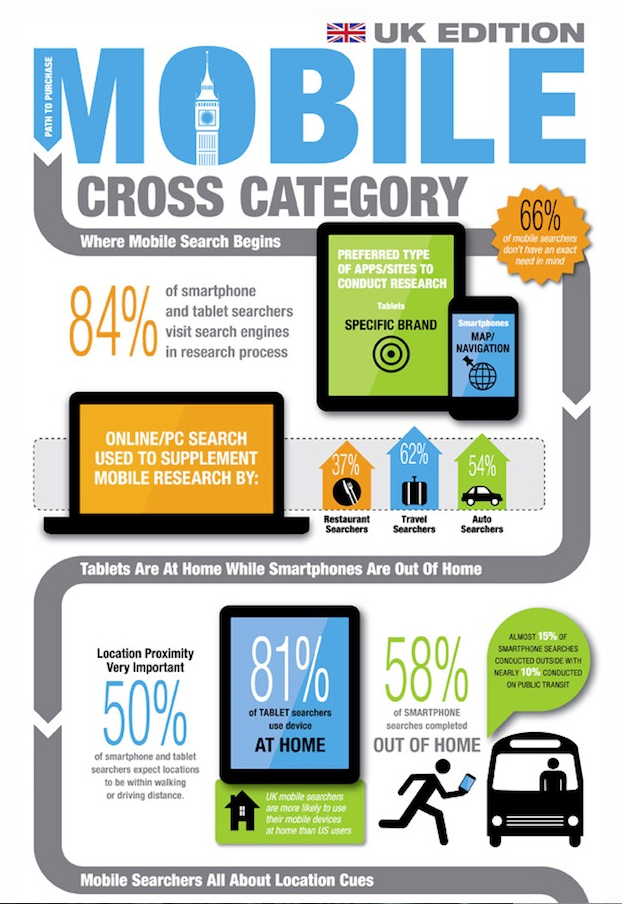By adaptive - May 1st, 2013
Businesses that can place social media effectively within their sales funnels will reap the rewards of customer loyalty
Understanding the sales funnel that supports any business is fundamental to its profitability. Management teams are often from a sales background and innately understand the sales process of their businesses to maximise revenue.
Corporations that have developed their sales funnel for decades now have to contend with the affect that social media is having on this process. Social media platforms are opening new avenues for the sales funnel to exploit, but at the same time, also challenging businesses to think differently, as their customers take more control of the sales funnel itself.
Social media has the power to expand the reach of any business’ sales funnel by utilising the propensity to share that social media has developed right across the consumer spectrum. Initially, social media allows your business to expand the top of its sales funnel and open more conversations with new prospective customers than has been possible at any time in the past.
And the most important aspect of social media and how it is influencing the sales funnel is the phenomenon of engagement. At the heart of social media is the relationship your business has with its customers. The traditional sales funnel was a passive mechanism that relied on a business seeking new customers for conversion. Social media places a whole new layer of interactivity onto the sales funnel that businesses can leverage for lead generation and ultimately conversion.
Clearly the influence that social media now has on the sales funnel within all businesses is profound.

[Source: http://blog.getsatisfaction.com/2011/04/13/social-media-sales-funnel/?view=socialstudies]
Lastly, the new age of the sales funnel offers businesses the chance to not only engage with more customers, but also to retain a higher proportion of them. Where the traditional sales funnel ended with the conversion of a customer, today social media enables businesses to feed these customers back into a perpetual sales cycle, which could last for decades. What is important, however, is to realise that social media isn’t an end in itself. Social media is just one of many sales channels your corporation needs to be exploiting.
Brand awareness
The power that social media hands to all businesses that properly leverage these platforms is critical to cultivate, as influence via these groups now has a measurable commercial value, and directly impacts the success of the sales funnel. As Nicole Kelly states in How to Measure Social Media: “Companies are starting to recognize the power of influence, and it has created a need to measure how influential people are. Companies like Klout have created algorithms to put a numerical value on people’s influence.”
Blogs with smaller yet highly qualified readerships should be a focus for the sales funnel within all businesses.

[Source: http://www.mobilemarketingwatch.com/infographic-understanding-social-influencers-30800/]
Brand awareness and the sales funnel are also now closely connected to influencers that have continued to use the evolution of social media from initial blogging to tweets and Facebook updates. Blogs may seem somewhat passé these day, but research from the editors at the MBA Marketing Degree Guide clearly showed the continued influence that blogs have. Just over a third of purchases are influenced by them.
Funnel development
The sales funnel has also been fragmented to a degree. Consumers faced with massive choice with the goods and services they want to buy, now take their time to make purchasing decisions. Often, they will use social media to make enquiries about an item before they enter the formal sales funnel.
“Many consumers are clearly unwilling to evaluate a product’s quality separately from their experiences with brand representatives,” states Bazaar Voice. “A great product won’t save brand word of mouth if the company doesn’t support customers with good service.”
Says Burson-Marsteller, Chief Global Digital Strategist Dallas Lawrence: “People want to interact and connect with major companies, and these platforms are the bridge directly to the heart of these organizations. What’s even more impressive is how much companies are engaging back with followers. Seventy-nine percent of corporate accounts attempt to engage on Twitter with retweets and @-mentions, and 70% of corporate Facebook pages are responding to comments on their walls and timelines.”
The connections that businesses now make are critical to get right, as research from Evolve24 clearly showed. Nearly half of respondents expected the company to read their Tweet, but brands often do not place these responses in the context of their sales funnel, and consequently lose a potential sale.
Do you expect a company to read your tweet?

[Source: http://www.evolve24.com/]
And the sales funnel has gone mobile. The initial connection that consumers now have with a brand’s sales funnel will often come from a tweet, as research from Socialbakers shows that over 60% of user-generated tweet mention brands.
“As smartphones become cheaper and more accessible, people are increasingly using them to talk about brands on social media,” said Jan Rezab, CEO of Social Bakers. “The question is: are brands doing everything they can to make the most of this valuable channel? For example, ensuring that their links are optimized for mobile, that they properly monitor the channel, analyze the best time to engage with their followers, and respond to their questions in a timely fashion.”
With Bill Dinan, President, Telmetrics also commenting: “As U.K. marketers outspend their global peers trying to reach mobile consumers, it is crucial to understand the U.K. mobile searcher. Our study reveals critical insights about mobile purchase behaviours, including preferred research tools, activities and mobile purchase influences. While two-thirds of mobile searchers don’t have a specific brand in mind, they do cite the importance of local relevancy. Advertisers that include local cues such as location info and phone numbers in their ads can positively influence mobile purchase decisions.”
Mobile has now become a key component of the purchase journey.

Social media has developed new rules of engagement when the sales funnel is considered. As the Awareness Network concluded: “The social funnel as a marketing tactic is the variable length of time users spend and their unique path through the social funnel continuum. The breadth of different types of users and the interactive and personalized nature of social media means that each person’s path through and endpoint within the social funnel is unique. This path helps to paint a picture of a user’s interest, intent, preference, and behaviour. A company’s ability to capture these unique paths and respond effectively based on activity within the social web will become the new frontier of successful marketing.”
What is clear is that all corporations that want to make the most of what social media has to offer must make these networks an integral component of their sales funnel. The commercial opportunities are vast for businesses that can quickly understand how social media influences their sales funnels and how these relationships can be nurtured across the entire customer life cycle.
McKinsey Consumer Decision Journey - See the full video here
Next Reads
October 2013, New York
How you can leverage social media for a more effective customer service function and better customer insight
Brochure Programme